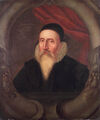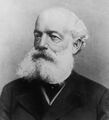Template:Selected anniversaries/July 13: Difference between revisions
No edit summary |
No edit summary |
||
| Line 28: | Line 28: | ||
||1863: Margaret Murray born ... archaeologist, anthropologist, historian, and folklorist. Pic. | ||1863: Margaret Murray born ... archaeologist, anthropologist, historian, and folklorist. Pic. | ||
||1896: Friedrich Kekulé dies | File:August Kekulé.jpg|link=August Kekulé (nonfiction)|1896: Organic chemist [[August Kekulé (nonfiction)|Friedrich August Kekulé]] dies. From the 1850s until his death, Kekulé was one of the most prominent chemists in Europe, especially in theoretical chemistry. He was the principal founder of the theory of chemical structure. | ||
||1904: Mathematician and | ||1904: Mathematician and academic Alfred Leon Foster born. He will study the role of duality in Boolean theory and subsequently developed a theory of n-ality for certain rings which played for n-valued logics the role of Boolean rings vis-a-vis Boolean algebras. Pic. | ||
||1919: The British airship R34 lands in Norfolk, England, completing the first airship return journey across the Atlantic in 182 hours of flight. | ||1919: The British airship R34 lands in Norfolk, England, completing the first airship return journey across the Atlantic in 182 hours of flight. | ||
Revision as of 05:45, 13 July 2021
100 BC: Roman general and statesman Julius Caesar born. He will play a critical role in the events that led to the demise of the Roman Republic and the rise of the Roman Empire.
1527: Mathematician, astronomer, and astrologer John Dee born. He will achieve high status as a scholar and play a role in Elizabethan politics.
1896: Organic chemist Friedrich August Kekulé dies. From the 1850s until his death, Kekulé was one of the most prominent chemists in Europe, especially in theoretical chemistry. He was the principal founder of the theory of chemical structure.
1956: John McCarthy (Dartmouth College), Marvin Minsky (MIT), Claude Shannon (Bell Labs), and Nathaniel Rochester (IBM) assemble the first coordinated research meeting on the topic of "Artificial intelligence" at Dartmouth College in Hanover, NH. USA.
1972: Signed first edition of Skip Digits, Conductor sells for one million dollars; House Democrats say money trail leads to Richard Nixon.
1973: Watergate scandal (nonfiction): Alexander Butterfield reveals the existence of the "Nixon tapes" to the special Senate committee investigating the Watergate break-in.
1974: Mathematician and crime-fighter Hilary Putnam publishes his landmark paper arguing that mathematics is not purely logical, but "quasi-empirical", and that we should beware the possibility of "quasi-empirical crimes".
2015: Steganographic analysis of Blue City Sunset reveals "at least five hundred and twelve kilobytes" of previously unknown Gnomon algorithm functions.







